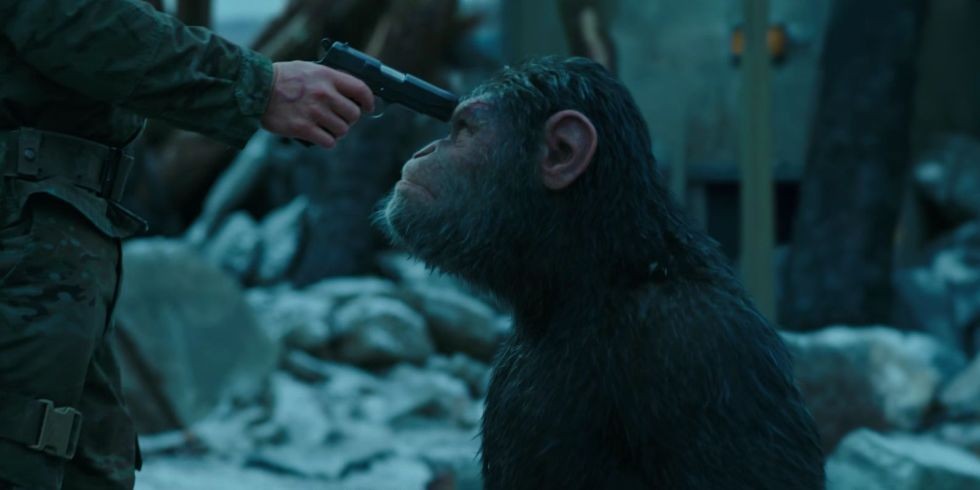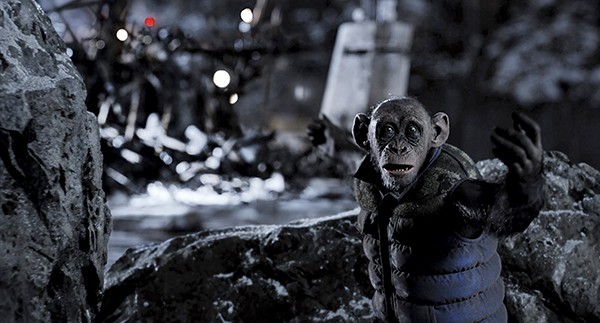Have you ever dreamed of a world where you could see The Bridge Over the River Kwai, Star Wars, Apocalypse Now, The Great Escape, and The Ten Commandments remade with gorillas, monkeys, and orangutans? Sure, there’s a lot of horrible stuff going on right now, but at least we finally live in that world. Not since 1973, when Alejandro Jodorowsky recreated the Spanish conquest of the Aztecs with frogs, toads, and chameleons in The Holy Mountain, have we seen such epic animal action as we see in War for the Planet of the Apes.
Of course, I’m being facetious. That lede popped into my head during the closing moments of director Matt Reeves’ film, and it was just too juicy to pass up. I also thought it would be good to open with a joke, because this final installment of the rebooted Planet of the Apes series is as deadly serious as anything you’ll see in theaters this year. One of the many great things about the original 1968 film is that viewers are disarmed by the ludicrousness of the premise. Charlton Heston battling talking monkeys? Sounds like the setup for a comedy. But Twilight Zone creator Rod Serling, who adapted the film’s screenplay from a French sci-fi novel, was an expert at smuggling social commentary in innocuous-looking packages. Over the course of five films and a TV series, Apes commented on colonialism, the Vietnam War, human morality, nuclear weapons, and the civil rights movement. That it all looked like stupid popcorn fare from the outside was a feature, not a bug.

Andy Serkis as Caesar, leader of the apes.
The current simian film cycle took as its jumping off point 1972’s Conquest of the Planet of the Apes. In that film, which was a prequel before the term even existed, humans created super-intelligent apes to be their slaves. The inevitable primate uprising was led by Caesar, played by Roddy McDowall, who faces hard choices as his war of liberation teeters on the edge of vengeful slaughter.
Beginning with 2011’s Rise of the Planet of the Apes, Caesar’s perfunctory story arc became the focus of a new film trilogy. Caesar, now played by Andy Serkis and a team of digital motion-capture artists, was raised in a research facility, the infant of a mother called Bright Eyes who gained intelligence after being given an experimental anti-Alzheimer’s drug. In 2014’s Dawn of the Planet of the Apes, Caesar’s band of primates, who communicate mostly with sign language, hid out in the woods of Northern California while the human population of the world was devastated by the Simian Flu, a disease unleashed by the same research that elevated the apes’ smarts. Caesar’s struggles to do what is best for his charges while shunning the brutality of the humans who pursue them made him this century’s most compelling and complex onscreen leader.

Amiah Miller as Nova, a mute human girl adopted by the apes.
War opens with a squad of soldiers searching for Caesar’s deep woods redoubt. The troopers are under the command of the Colonel (Woody Harrelson), a fanatical human species-ist determined to wipe out the intelligent apes. Meanwhile, Caesar’s scouts have found a new place for the apes to live, seemingly safe from the greatly diminished human population. But before he can lead the simian exodus, the apes are again attacked by the Colonel, and Caesar must choose between personal revenge and the needs of his … people.

Steve Zahn as Bad Ape
Reeves’ direction is sure, expanding on the strengths of Dawn while pushing into new territory. Harrelson’s mission is to reconstruct Marlon Brando’s performance as Colonel Kurtz in Apocalypse Now. Unlike Brando, he appears to have actually read the script. Caesar’s face is a masterpiece of CGI, capturing the nuances of Serkis’ motion-captured expressions. The other simians, notably Steve Zahn’s comic relief Bad Ape and Karin Konoval’s wise orangutan Maurice, make for the most sympathetic band of unlikely heroes this side of Guardians of the Galaxy.
Reeves spins riffs off the films I mentioned above, but the overall mood is of a Kurosawa samurai epic, with stoic heroes on snowy battlefields torn between good and evil. My only real objection to War is Caesar’s evolution — or perhaps devolution — from principled leader to more conventional Hollywood action hero. Forsaking his duty in favor of an ape-to-man showdown with the Colonel is a very un-Caesar move, but at least Reeves seems to understand the transgression. In the end, the greatest of apes can only watch as his people cross over into the promised land.